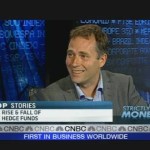 Editor’s Note: Author and recovering hedge funder Lars Kroijer provided this guest-post, making the case that most of us would be better off acknowledging we do not have an edge over markets. Most of us can’t consistently “beat the market,” but many of us pay a lot in fees to try.
Editor’s Note: Author and recovering hedge funder Lars Kroijer provided this guest-post, making the case that most of us would be better off acknowledging we do not have an edge over markets. Most of us can’t consistently “beat the market,” but many of us pay a lot in fees to try.
Please also see related post: Book Review of Investing Demystified by Lars Kroijer
and podcast Part I – Lars Kroijer on Global Diversification
and postcast Part II – Lars Kroijer on Having Edge
Take it away Lars…
Edge over the markets, do you have it, and the 7 Porsche cars it may cost you to find out
by Lars Kroijer
Most literature or media on finance today tells us how to make money. We are bombarded with stock tips about the next Apple or Google, read articles on how India or biotech investing are the next hot thing, or told how some star investment manager’s outstanding performance is set to continue. The implicit message is that only the uninformed few fail to heed this advice and those that do end up poorer as a result. We wouldn’t want that to be us!
What if we started with a very different premise? The premise that markets are actually quite efficient. Even if some people are able to outperform the markets, most people are not among them. In financial jargon, most people do not have edge over the financial markets, which is to say that they can’t perform better than the financial market through active selection of investments different from that made by the market. Embracing and understanding this absence of edge as an investor is a key premise of the investment methods suggested in my recent book Investing Demystified (Financial Times Publishing), and something I believe is critical for all investors to understand.
Consider these two investments portfolios:
A) S&P500 Index Tracker Portfolio like an ETF or index fund.
B) A portfolio consisting of a number of stocks from the S&P 500 – any number of stocks from that index that you think will outperform the index. It could be one stock or 499 stocks, or anything in between, or even the 500 stocks weighted differently from the index (which is based on market value weighting).
If you can ensure the consistent outperformance of portfolio B over portfolio A, even after the higher fees and expenses associated with creating portfolio B, you have edge investing in the S&P500. If you can’t, you don’t have edge.
At first glance it may seem easy to have edge in the S&P500. All you have to do is pick a subset of 500 stocks that will do better than the rest, and surely there are a number of predictable duds in there. In fact, all you would have to do is to find one dud, omit that from the rest and you would already be ahead. How hard can that be? Similarly, all you would have to do is to pick one winner and you would also be ahead.
Although the examples in this piece are from the stock market, investors can have edge in virtually any kind of investment all over the world. In fact there are so many different ways to have edge that it may seem like an admission of ignorance to some to renounce all of them. Their gut instinct may tell them that not only do they want to have edge, but the idea of not even trying to gain it is a cheap surrender. They want to take on the markets and outperform as a vindication that they “get it” or are somehow of a superior intellect or street-smart. Whatever works!
The Competition
When considering your edge who is it exactly that you have edge over? The other market participants obviously, but instead of a faceless mass, think about whom they actually are and what knowledge they have and analysis they undertake.

Imagine the portfolio manager of the technology focused fund for a highly rated mutual fund / unit trust who like us is looking at Microsoft. Let’s call them Ability Tech and the fund manager Susan.
Susan and Ability have easy access to all the research that is written about Microsoft including the 80 page in-depth reports from research analysts from all the major banks including places like Morgan Stanley or Goldman Sachs that have followed Microsoft and all its competitors since Bill Gates started the business. The analysts know all of the business lines of Microsoft, down to the programmers who write the code to the marketing groups that come up with the great ads. They may have worked at Microsoft or its competitors, and perhaps went to Harvard or Stanford with senior members of the management team. On top of that, the analysts speak frequently with the trading groups of their banks who are among the market leaders in the trading of the Microsoft shares and can see market moves faster and more accurately than almost any trader.
All research analysts will talk to Susan regularly and at great length because of the commissions Ability’s trading generates. Microsoft is a big position for Ability and Susan reads all the reports thoroughly – it’s important to know what the market thinks. Susan enjoys the technical product development aspects of Microsoft and she feels she talks the same language as techies, partly because she knew some of them from when she studied computer science at MIT. But Susan’s somewhat “nerdy” demeanour is balanced out by her “gut feel” colleague, who see bigger picture trends in the technology sector and specifically sees how Microsoft is perceived in the market and ability to respond to a changing business environment.
Susan and her colleagues frequently go to IT conferences and have meetings with senior people from Microsoft and peer companies, and are on first name basis with most of them. Microsoft also arranged for Ability to visit the senior management at offices around the world, both in sales roles and developers, and Susan also talks to some of the leading clients.
Like the research analysts from the banks, Ability has an army of expert PhD’s who study sales trends and spot new potential challenges (they were among the first to spot Facebook and Google). Further, Ability has economists who study the US and global financial system in detail as the world economy will impact the performance of Microsoft. Ability also has mathematicians with trading pattern recognition technology to help with the analysis.
Susan loves reading books about technology and every finance/investing book she can get her hands on, including all the Buffett and value investor books.
Susan and her team know everything there is to know about the stocks she follows (including a few things she probably shouldn’t know, but she keeps that close to her chest), some of which are much smaller and less well researched than Microsoft. She has among the best ratings among fund managers in a couple of the comparison sites, but doesn’t pay too much attention to that. After doing this for over twenty years she knows how quickly things can change and instead focuses on remaining at the top of her game.
Does Susan have edge?

Do you think you have edge over Susan and the thousands of people like her? If you do, you might be brilliant, arrogant, the next Warren Buffett or George Soros, be lucky, or all of the above. If you don’t, you don’t have edge. Most people don’t. Most people are better off admitting to themselves that once a company is listed on an exchange and has a market price, then we are better off assuming that this is a price that reflects the stock’s true value, incorporating a future positive return for the stock, but also a risk that things don’t go according to plan. So it’s not that all publicly listed companies are good – far from it – but rather that we don’t know better than to assume that their stock prices incorporate an expectation of a fair future return to the shareholders given the risks. We don’t have edge.
When I ran my hedge fund I would always think about the fictitious Susan and Ability. I would think of someone super clever, well connected, product savvy yet street-smart who had been around the block and seen the inside stories of success and failure. And then I would convince myself that we should not be involved in trades unless we clearly thought we had edge over them. It is hard to convince yourself that this is possible, and unfortunately even harder sometimes for it to actually be true.
The costs add up
On average individual investors trying to beat the markets would not systematically pick underperforming stocks – on average they would pick stocks that perform like the overall market. They would have a sub-optimal portfolio that would not be as well diversified, but in my view the main underperformance comes from the costs incurred.
The most obvious cost when you trade a stock is the commission to trade. While that has been lowered dramatically with online trading platforms it is far from the only cost. A few others to consider:
- Bid/offer spread
- Price impact
- Transaction tax
- Turnover
- Information/research cost
- Capital gains tax
- Transfer charge
- Custody charge
- Advisory charge
- Your time?
Depending on your circumstances and size of portfolio you may find that it costs more than 1% each time you trade the portfolio (the low fixed online charge per trade is only a small commission percentage if you trade large amounts). This is certainly less than it used to be decades ago, but for someone who is frequently trading their portfolio it will be a major impediment to performance. In addition capital gains taxation tends to be far higher for frequent traders and the “hidden fees” like custody or direct or indirect costs of the research and information gathering come on top. The more this adds up to, the greater the edge someone will have to have to just keep up with the market.

I recently saw a particularly cringe-worthy advertisement where a broker compared trading on their platform to being a fighter pilot, complete with Tom Cruise style Ray-Ban sunglasses and an adoring blonde. I remember thinking “I would love to sell something to whoever falls for that”. The platform makes more money the more frequently you trade, and they obviously think you trade more if you think it’ll make you be like Tom Cruise.
You just have to pick your moment?
Warren Buffett is quoted as saying that “just because markets are efficient most of the time does not mean that they are efficient all of the time”. To quote Buffett in investing is like quoting Tiger Woods in golf. He is a world famous investor with a long history of being right, so we are all bound to feel a little deferential.
Buffett might be right of course. Markets might be perfectly efficient some or even most of the time and horribly inefficient at other times. But how should we mere mortal investors know which is when? Can you predict when these moments of inefficiency occur or recognize them when you see them? Clearly we can’t all see the inefficiencies at the same time or the market impact of many investors trying to do the same thing would rectify any inefficiency in an instant. But can you as an individual investor spot a time of inefficiency?
I think that it is incredibly hard to have edge in the market even occasionally, but that some people have it, even most the time. But you have to be honest with yourself. If you have a long history of picking moments where you spotted a great opportunity, moved in to take advantage of it and then exited with a profit, then you may indeed occasionally have edge. You should use this edge to get rich.
For the sceptics
Some readers will think this is a load of rubbish. It may be that they consider themselves among the sophisticated investors who can outperform the market. You might of course be in the very small minority of people where this is the case, but if you are going to claim edge and actively manage your own portfolio I would encourage you to consider a couple of things:
- Be clear about why you have edge to beat the market, and be sure you are not guilty of selective memory. Unlike predicting the winner of Saturday’s football game, predicting that Google was going to double when it later did makes us appear wise and informed, and perhaps we are subconsciously more likely to remember that than when we proclaimed Enron a doubler. Because we add and take money out of our accounts continuously we are unlikely to keep close track of our exact performance and can continue the delusion indefinitely.
- Do not trade frequently. If you turn over your portfolio more than once per year you should have a really good reason to do so. The all-in costs of trading are high and greatly reduce long-term returns.
- Regardless of whether you have edge or not, be sure to think a lot about risk levels, taxes, liquidity, and how your investment portfolio correlates with the rest of your assets and liabilities.
- Do not start panicking if things go against you.
- You may decide you have edge in one sector, geography, or asset class. That’s fine. Do exploit this edge, but also make sure it does not lead to undue geographic or sector concentration and invest like someone without edge in the rest of your portfolio.
- Continuously reconsider your edge. There is no shame and likely good money in acknowledging that you belong to the vast majority of people that don’t have edge. Investors who initially do well in the markets will often think it was skill rather than luck based on that first experience. Many reconsider later…
The cost of time spent managing the portfolio are individual (we value our time differently) and while some consider it a fun hobby or game akin to betting even, others consider it a chore they would rather avoid. Someone may spend 10 hours “work time” per week on their portfolio which at an “opportunity cost” of time of £50 per hour for 40 weeks/year is £20,000 per year on top of all the other costs discussed. This clearly makes no sense for a £100,000 portfolio, and is too costly even for a £1million portfolio, and on top of all everything else they would benefit from less time spent.
Should we give our money to Susan and Ability?
Going back to the beginning, if you conclude that Susan is as plugged in and informed as anyone could be, why not just give her our money and let her make us rich?
Many investors do give their money to the many Ability Tech type products and Fidelity and its peers continuously develop mutual funds for everything you can imagine. There are funds for industrials, defensive stocks (and defence sector stocks for that matter), gold stocks, oil stocks, telecoms, financials, technology, plus many geographic variations. In my view many investors have become “fund pickers” instead of “stock pickers”. Even today, years after the benefits of index tracking have become clear to many investors there is perhaps £85 invested with managers that try to outperform the index (“active” managers) for every £15 invested in index trackers.
When investors pick from the smorgasbord of tempting-looking funds how do they know which ones are going to outperform going forward?
Is it because they have a feeling that IT stocks will outperform the wider markets?
If so, are you effectively claiming edge by suggesting that you can pick sub-sets of the market that will outperform the wider markets? Consistently picking outperforming sectors would be an amazing skill.
Is it because of Susan’s impressive resume (you think that someone with her impressive background will find a way to outperform the market)?
If so, your edge is essentially saying that you know someone who has edge (Susan), which is really another form of edge? This is the kind of edge many investors into hedge funds claim. They’ll say stuff like “through our painstaking research process we select the few outstanding managers who consistently outperform”. Maybe so, but that is also a case of edge.
Is it because they feel Ability Tech has come up with some magic formula that will ensure their continued outperformance in their funds generally?
There is little data to suggest that that you can objectively pick which mutual funds are going to outperform going forward.
Is it because your financial advisor considers it a sound choice?
First figure out if the advisor has a financial incentive to give you the advice, like a cut of the fees. The world is moving towards greater clarity on how advisors get paid, making it easier to understand if there is a financial incentive to recommend some products – keep in mind that comparison sites also get a cut of the often hefty active manager fees. Now consider if your advisor really has the edge required to make this active choice. Unless she has a long history of getting these calls right I would question if she has the special edge that eludes most (and would she really share this incredibly unique insight if she had it?).
They have done so well in the past?
Countless studies confirm that past performance is a poor predictor of future performance. If life was only so easy – you just pick the winners and away you go…
We are also often driven by the urge to do something proactive to better our investment returns instead of passively standing by. And what better than investing with a strong performing manager from a reputable firm in a hot sector we have researched?
Mutual fund/unit trust charges vary greatly. Some charge up-front fees (though less frequently than in the past), but all charge an annual management fee and expenses (for things like audit, legal, etc.), in addition to the cost of making the investments. The all-in costs span a wide range, but if you assume that a total of 2.5% per year that is probably not too far off. So if someone manages £100 for you, the all-in costs of doing this will amount to approximately £2.5 per year come rain or shine.
If markets are steaming ahead and are up 20%+ every year, paying 1/10th to the well-known steward of your money may seem a fair deal. The trouble is that no markets go up 20% per year every year. We can perhaps expect equity markets to be up 4-5% on average per year above inflation so you need to pick a mutual fund that will outperform the markets by 2% before your costs to be no worse off than if you had picked the index tracking ETF, assuming ETF fees and expenses of 0.5% per year.
You need to be able to pick the best mutual fund out of 10 for it to make sense!
To give an idea of how much the fees impact over time consider the example of investing £100 for 30 years. Suppose the markets return 7% per year (5% real return plus 2% inflation a fairly standard expectation) and the difference becomes all too obvious over time (2% fee disadvantage in this case compared to a tracker fund).
Ability Tech and its many competitors go to great lengths to show their data in the brightest light, but a convincing number of studies show that the average professional investor does not beat the market over time, but in fact underperform by approximately the fees.
There is of course the possibility that you are somehow able to pick only the best performing funds. Take the example that you had £100 to invest in either an index tracker, or a mutual fund that had a cost disadvantage of 2% per year compared to the tracker. Suppose further that the market made a return of 7% per year for the next ten years, and that the standard deviation (standard measure of risk that gives an idea of the range of returns you can expect and with what frequency) of each mutual fund performance relative to the average mutual fund performance was 5% (the mutual funds predominantly own the same stocks as the index and their performance will be fairly similar as a result).
Comparing an actively managed portfolio to an index tracker is unfortunately not as simple as subtracting 2% from the index tracker to get to the actively managed return. The returns will vary from year to year, and in some years the actively managed fund will outperform the index it is tracking. Some funds will even outperform the index over the ten year period; if you can pick the outperforming fund consistently, you have edge. If you can’t, you should buy the index.
In approximately 90% of the cases in the ten year example above the index tracker would outperform the actively managed mutual fund, which is roughly in line with what historical studies suggest. So in order for it to make sense to pick a mutual fund over the index tracker you have to be able to pick the 10% best performing mutual funds. That would be pretty impressive.
If you did not have edge and blindly picked a mutual fund instead of the index tracker you would on average be about £30 worse off on your £100 investment after ten years because of the higher costs.

To put in perspective the cumulative impact over a saver’s life consider someone earning £50,000 a year on average between ages 25-67 who puts aside 10% of savings in the equity markets (ignoring tax) – that is roughly what a senior London Underground train driver makes. If equity markets perform similarly to how they have in the past (so about 5% per year above inflation) the average difference in money for the saver at retirement for someone who invested with an active fund manager compared to a product that simply tracks the market will be the equivalent of the value of about 7 Porsche cars (or approximately £280,000 in today’s money). Think about this – a fairly typical saver left poorer by a staggering total amount of money over a life time with the money going to the financial sector. The finance sector won’t like you doing it, but unless you have an amazing ability to pick only the best active fund managers, buy the product that replicates the market and you’ll be much better off in the long run.
While you can bet your bottom dollar that the 10% of mutual funds that outperformed the index would market their special skills in advertisements, historical performance is not only poor predictors of future returns, but it can be very hard to distinguish between what has been chance (luck) and skill (edge). Just like one out of 1024 coin flippers would come up heads 10 flips in a row, some managers would do better simply out of luck. In reality the odds are much worse in the financial markets as fees and costs eat into the returns. However ask the manager who has outperformed five years in a row (every 50th coin flipper…) and she will disagree with the argument that she was just lucky, even as some invariably are. Likewise some managers underperform the market several years in a row simply due to bad luck, but those disappear from the scene and thus introduce a selection bias where only the winners remain. Sometimes this makes the industry appear more successful than it has actually been.
Edge can take many forms
While the discussion above may suggest that having edge involves picking winning stocks or successful active managers only, there are many ways investors implicitly claim edge in their investments, often without having it. Examples include:
Will midcaps outperform large caps?
Will Buffett continue his outperformance?
Will emerging markets outperform developed markets the next decade?
Will tech stocks do better than financial stocks?
Will Germany outperform the UK?
Similarly, the discussion of edge is not exclusive to stock markets. You can have investment edge in many things other than the stock market and profit greatly from that edge. Examples include:
- Will Greece default on its loans?
- Will the price of oil increase further?
- Will the USD/GBP exchange rate reach 2 again?
- Will the property market increase/decrease?
- Will interest rates remain low?
- The list goes on…
Investing without edge
For someone to accept that they don’t have edge is a key “aha” moment in their investing lives, and perhaps without knowing it at first, they will be much better off as a result. At this point you are hopefully at least considering a couple of things:
- Edge is hard to achieve and it is important to be realistic about if you have it.
- Conceding edge is a sensible and very liberating conclusion for most investors. It makes life lot easier (and wealthier) to acknowledge that you can’t better the aggregate knowledge of a market swamped with thousands of experts that study Microsoft and the wider markets.
Once you have conceded edge you are unfortunately not done. In fact you have only arrived at the starting point and started your journey as an investor who has conceded edge. There is every change that you will be a far wealthier investor as a result of this.
For the edgeless investor it makes sense to pick the most diversified and cheapest portfolio of world equities and combining that with some government and potentially corporate bonds through cheap index tracking products that suit your risk and tax profile. Do this while considering your non-investment assets/liabilities, time horizon of investment, and a few other things, and you are doing extremely well. Once you embrace that you don’t have edge it is fortunately pretty intuitive and really not that difficult to put together a simple and powerful investment portfolio. More on that in the next blog post!
Lars Kroijer is the author of Investing Demystified – How to Invest Without Speculation and Sleepless Nights from Financial Times Publishing. You can follow him on Twitter @larskroijer.
Please also see related posts:
The efficient market hypothesis as best stated by Nate Silver
Book Review of Investing Demystified by Lars Kroijer
and podcast Part I – Lars Kroijer on Global Diversification
and postcast Part II – Lars Kroijer on Having Edge
Lars on CNBC discussing his book Money Mavericks
Post read (8241) times.







